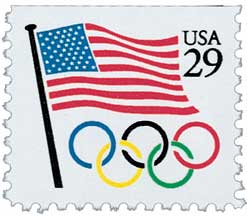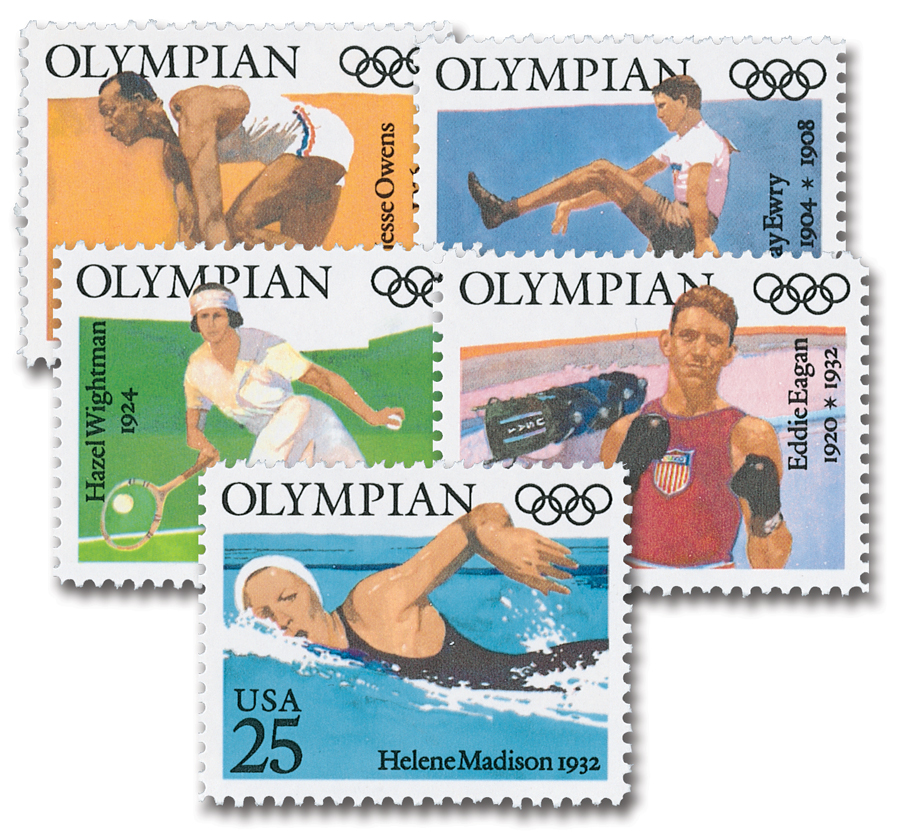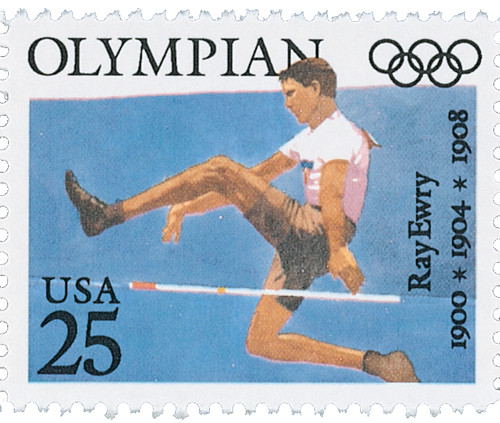
# 2496-2500 FDC - 1990 25c Olympians
1990 25¢ Olympians
City: Minneapolis, MN
Quantity: 35,717,500
Printed By: American Bank Note Company
Printing Method: Photogravure
Perforations: 11
Color: Multicolored
Opening of 1992 Summer Olympics

On July 25, 1992, the opening ceremonies marked the start of the Games of the XXV Olympiad in Barcelona, Spain. These games included many firsts, lasts, and records…
This year – 1992 – was the last year the Summer and Winter Olympics occurred in the same year. After that, the winter games were held two years after the summer event. This Olympics also marked the first time since 1972 that no nations boycotted the games for political reasons.
The games officially began on July 25, 1992. During the festive ceremonies, Greek singer Agnes Baltsa sang “Romiossini” and Alfredo Kraus sang the Olympic Hymn. Paralympic archer Antonio Rebollo lit the Olympic flame cauldron with a flaming arrow. Aiming over the cauldron, the arrow ignited the gas emanating from cauldron and landed safely outside the stadium. Freddie Mercury, frontman of the band Queen, wrote one of the main musical themes for the games, “Barcelona,” though he died eight months before the games.

In all, 169 national teams participated in the 1992 Summer Olympics with a total of 9,356 athletes (6,652 men and 2,704 women). These were the first Olympics since the fall of the Soviet Union and reunification of Germany. Germany competed as a single team for the first time in 32 years. While the Baltic States of Estonia, Latvia, and Lithuania competed as their own teams for the first time since 1936, the 12 other former Soviet nations competed as part of the Unified Team. The Unified Team won the most gold and silver medals at 45 and 38 respectively, and the most overall at 112. The United States was close behind with 108 overall. This year also marked the first time South Africa was allowed to compete since 1960, when the country was banned because of apartheid.
One of the major highlights of the games was America’s “Dream Team” of gold-medal winning basketball players. It was the first time NBA players were allowed to compete, and stars like Michael Jordan and Larry Bird shone on the courts. Among the personal successes were the six gold medals (four in one day) won by Vitaly Scherbo in men’s gymnastics. Scherbo, from Belarus and competing for the Russian Unified Team, won five golds in individual events, and one for the team event.

Also, 13-year-old Fu Mingxia of China won the gold medal in the high dive – making her one of the youngest Olympic gold medalists in history. In 1991, she had won the gold in the same event at the World Swimming Championships – at age 12, making her the youngest person to ever win a world title in any sport. Fu went on to win gold medals in the 1996 and 2000 Olympics, as well. Also in the pool, 14-year-old Japanese athlete Kyoko Iwasaki became the youngest swimmer to win gold when she won the 200 meter breaststroke.
American runner Evelyn Ashford became one of just six female athletes to win four Olympic gold medals in track and field. FermÃn Cacho was the host country’s hero, winning their first-ever gold medal in a running event for the 1,500 meter race.

The games consisted of 286 events in 32 sports, with several sports making their debuts. Baseball became an official Olympic sport in 1992, after being demonstrated in six prior Olympics. Badminton and women’s judo were added to the competition and slalom canoeing was added to the games after a 20-year absence. In addition, roller hockey, Basque pelota, and taekwondo were added as demonstration sports.
The games officially closed on August 9, 1992. The games had a positive overall effect on Barcelona, bringing in billions of dollars of infrastructure improvements. The games also brought international focus to the city, which became one of the most visited in Europe after Paris, London, and Rome.
1990 25¢ Olympians
City: Minneapolis, MN
Quantity: 35,717,500
Printed By: American Bank Note Company
Printing Method: Photogravure
Perforations: 11
Color: Multicolored
Opening of 1992 Summer Olympics

On July 25, 1992, the opening ceremonies marked the start of the Games of the XXV Olympiad in Barcelona, Spain. These games included many firsts, lasts, and records…
This year – 1992 – was the last year the Summer and Winter Olympics occurred in the same year. After that, the winter games were held two years after the summer event. This Olympics also marked the first time since 1972 that no nations boycotted the games for political reasons.
The games officially began on July 25, 1992. During the festive ceremonies, Greek singer Agnes Baltsa sang “Romiossini” and Alfredo Kraus sang the Olympic Hymn. Paralympic archer Antonio Rebollo lit the Olympic flame cauldron with a flaming arrow. Aiming over the cauldron, the arrow ignited the gas emanating from cauldron and landed safely outside the stadium. Freddie Mercury, frontman of the band Queen, wrote one of the main musical themes for the games, “Barcelona,” though he died eight months before the games.

In all, 169 national teams participated in the 1992 Summer Olympics with a total of 9,356 athletes (6,652 men and 2,704 women). These were the first Olympics since the fall of the Soviet Union and reunification of Germany. Germany competed as a single team for the first time in 32 years. While the Baltic States of Estonia, Latvia, and Lithuania competed as their own teams for the first time since 1936, the 12 other former Soviet nations competed as part of the Unified Team. The Unified Team won the most gold and silver medals at 45 and 38 respectively, and the most overall at 112. The United States was close behind with 108 overall. This year also marked the first time South Africa was allowed to compete since 1960, when the country was banned because of apartheid.
One of the major highlights of the games was America’s “Dream Team” of gold-medal winning basketball players. It was the first time NBA players were allowed to compete, and stars like Michael Jordan and Larry Bird shone on the courts. Among the personal successes were the six gold medals (four in one day) won by Vitaly Scherbo in men’s gymnastics. Scherbo, from Belarus and competing for the Russian Unified Team, won five golds in individual events, and one for the team event.

Also, 13-year-old Fu Mingxia of China won the gold medal in the high dive – making her one of the youngest Olympic gold medalists in history. In 1991, she had won the gold in the same event at the World Swimming Championships – at age 12, making her the youngest person to ever win a world title in any sport. Fu went on to win gold medals in the 1996 and 2000 Olympics, as well. Also in the pool, 14-year-old Japanese athlete Kyoko Iwasaki became the youngest swimmer to win gold when she won the 200 meter breaststroke.
American runner Evelyn Ashford became one of just six female athletes to win four Olympic gold medals in track and field. FermÃn Cacho was the host country’s hero, winning their first-ever gold medal in a running event for the 1,500 meter race.

The games consisted of 286 events in 32 sports, with several sports making their debuts. Baseball became an official Olympic sport in 1992, after being demonstrated in six prior Olympics. Badminton and women’s judo were added to the competition and slalom canoeing was added to the games after a 20-year absence. In addition, roller hockey, Basque pelota, and taekwondo were added as demonstration sports.
The games officially closed on August 9, 1992. The games had a positive overall effect on Barcelona, bringing in billions of dollars of infrastructure improvements. The games also brought international focus to the city, which became one of the most visited in Europe after Paris, London, and Rome.













